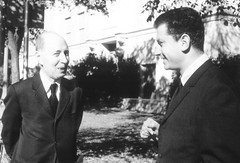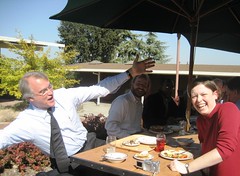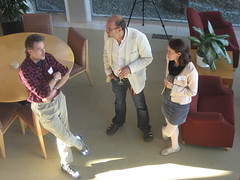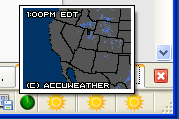Of two books on similar topics with similar publication dates, one is ranked #116 on Amazon (as of this writing, yesterday it was #350), the other is at #1,036,339 (as of this writing).* The former has an official publication date of October 17, 2006 (exactly a week ago) and has zero reviews on Amazon (as of this writing). The latter has an official publication date of July 27, 2006 and also has zero reviews on Amazon. Given zero reader reviews in both cases and the recent publication of the former manuscript, it would be hard to argue that it is its superior quality that has catapulted it to the top of Amazon’s popularity index. So what else differs?
Kati Marton’s book on The Great Escape: Nine Jews Who Fled Hitler and Changed the World was published by Simon & Schuster, a trade press with a powerful marketing machine. My father István Hargittai’s book on The Martians of Science: Five Physicists Who Changed the Twentieth Century
was published by Simon & Schuster, a trade press with a powerful marketing machine. My father István Hargittai’s book on The Martians of Science: Five Physicists Who Changed the Twentieth Century was published by Oxford University Press (OUP), an academic press notorious for not putting any marketing weight behind its publications naively assuming that quality will yield popularity.
was published by Oxford University Press (OUP), an academic press notorious for not putting any marketing weight behind its publications naively assuming that quality will yield popularity.
Kati Marton is a journalist formerly married to the late ABC anchor Peter Jennings, currently married to Ambassador Richard Holbrooke. Her book has blurbs from the likes of Tom Brokaw and has gotten coverage on ABC’s Web site among many other venues. István Hargittai is a scientist in Budapest married to Magdolna Hargittai another scientist, both members of the Hungarian Academy of Sciences. His book doesn’t have blurbs from the likes of Tom Brokaw (it only does from two scientists, true, both are Nobel laureates) and has not gotten coverage in any major outlets.
 Based on their earlier work, both authors are good writers. Both have relevant credentials for writing about this topic. Kati Marton is the daughter of Hungarians and has written about people from that area of the world before. István Hargittai is a Hungarian scientist and knew two of his five subjects (Eugene Wigner and Edward Teller) and has written numerous books about scientists. After OUP commissioned him to write this book in 2003, he spent the next couple of years doing nothing but research and writing on this book and became completely impassioned by the project. It’s worth a read.
Based on their earlier work, both authors are good writers. Both have relevant credentials for writing about this topic. Kati Marton is the daughter of Hungarians and has written about people from that area of the world before. István Hargittai is a Hungarian scientist and knew two of his five subjects (Eugene Wigner and Edward Teller) and has written numerous books about scientists. After OUP commissioned him to write this book in 2003, he spent the next couple of years doing nothing but research and writing on this book and became completely impassioned by the project. It’s worth a read.
I am surprised that Marton’s book has been as popular as it has given the niche topic. It may just be a testament to how easy it is to get a high rank on Amazon, that is, even a relatively low number of sales will get you a reasonable ranking. (Actually, I blogged about this four years ago.) In any case, given a seeming interest in this topic, my father’s book should have a chance as well. But if no one knows about a book, no one can buy it or read it.
A few years ago, Wired Editor Chris Anderson started writing about the long tail, the idea that “the future of entertainment is in the millions of niche markets at the shallow end of the bitstream.” He explained that a niche market book published in 1988 and soon forgotten got a second chance a decade later when a similar book appeared and resulted in renewed interest toward the first.
Can this case be generalized to two similar books appearing at around the same time? Can such an outcome occur even if one of the books is completely unknown due to the utter lack of marketing on behalf of its publisher and so no one buying the hyperpublicized piece will know about the existence of the other? This blog post is an attempt to make the connection.
It’s also a reality check that traditional positions and organizational arrangements still matter. But I’m happy to be proven wrong. Prove me wrong folks. Can a bit of online discussion lead to my father’s book gaining a bit of traction?
[*] It turns out, on UK Amazon, the discrepencies are not as large: #72,506 vs #227,172 (as of this writing).
UPDATE: If you’re interested in purchasing a copy of my father’s book and would like a discount, you can use this flyer [pdf] and save 20%. It requires going through OUP directly, however. Sorry I didn’t post this earlier, I didn’t have a copy.










